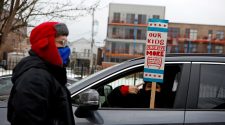Lessons that once took veteran teacher Sheila Baab minutes to prepare, now take hours.
Baab, a bubbly mom of two, makes regular home visits to her Paxinosa Elementary School fifth-graders’ homes to deliver school supplies.
She tries to anticipate every barrier to learning her students might face and solve them.
No thermometers at home for a daily screening? She got one donated for every student. Are they hungry? Do they need a mask? Baab bought more than 250 masks for kids and sends students home with food on in-person learning days.
This is teaching in the age of the coronavirus, where educators often feel like despite their best efforts they’re still not doing all they can. Or unable to reach their neediest students via a screen.
“I think the kids are overwhelmed and their heads are spinning,” Baab said. “They keep coming and trying and doing the best they can. We are a safety net for them.”
Recognizing all that’s being asked of educators today, the United Way of the Greater Lehigh Valley is partnering with Resilient Lehigh Valley and Pinebrook Family to offer free monthly sessions of virtual mental health hours for early childhood, elementary and secondary educators.
“Educators are overwhelmed with the behavior they are seeing and struggling with how they best support (students),” said Beth Tomlinson, senior director of education for the local United Way and co-founder of Resilient Lehigh Valley. “… They are the IT director, the social and emotional learning coach. A lot is being put on our educators now and I think they are feeling the toll.”
Patchwork of classrooms
Lehigh Valley school districts settled on an array of learning options this fall from all virtual in the Allentown School District to fully in-person in the Saucon Valley School District. But rising coronavirus cases mean September’s plans are now fluid as new state rules force temporary school building closures and educators are racing to adapt.
The Bethlehem, Easton and Northampton area school districts all recently preemptively halted their hybrid-learning schedules through the holiday season.
Baab and her Easton Area School District colleagues are working in overdrive to navigate a school year unlike any other. It’s made her school community stronger as they’ve banded together, she said. But she worries many, including herself, may burn out long before the school year ends.
Baab has her own household to run and she’s constantly worried about bringing the coronavirus home to her own family.
“We went to school to help children. I have a type A personality,” Baab said. “I would never say my day ends at 3:45, even though we are told turn off your computer, your day is over. You can’t physically do that. There is not enough time in the day anymore.”
The pandemic’s not just an economic and medical public health crisis, it’s also a mental health crisis, said Tomlinson, of the United Way. And many American families are struggling from the pandemic’s effects. They’ve lost jobs, income, child care and loved ones. Parents are stressed and children are unmoored without regular routines.
Those struggles follow students into the classroom each day as educators grapple with dramatic changes in how they teach and reach children amid the tumult that’s been 2020.
“You can’t pour from an empty vessel,” Tomlinson said.
Daycares struggling
Daycare owner and teacher Michele McEllroy feels like she’s been operating in crisis mode for months. Pre-pandemic, her Cuddle Zone Learning Center in Allentown enrolled 150 children, now she’s at about half that with reduced hours.
“Every day I am worried about our financials and our ability to stay open,” McEllroy said.
The current enrollment feels sustainable, for now, both financially and from a safety perspective, she said. Each classroom operates as a pod with 10 students and two teachers, so if a staff member falls ill the other one can cover and stay within state-mandated student-to-teacher ratios.
The center shutdown after its first COVID-19 case in July, because McEllroy feared it spreading. Since then, things were going smoothly until Thanksgiving. Now many family members of students are testing positive, she said. It is tough because many of her parents are essential workers and COVID-19 mimics so many of the symptoms of regular childhood illnesses.
“I think parents are at the point now where it is very difficult for them to keep children home with any kind of symptom because employers might not be as forgiving right now because it is the holiday season,” McEllroy said.
She’s also juggling just keeping the center supplied with basic things like gloves for diaper changes.
“Gloves have quadrupled in price over the last few months,” McEllroy said. “Last month’s supply, we got four cases of gloves and some soap and my bill was $993 and that lasts me for a month.”
While K-12 educators are struggling with behavior issues from students, McEllroy’s been struck that her younger students are thriving and more well-behaved compared to a typical school year. It may be the lower student-to-teacher ratios, the months spent at home or a mix, she said.
“The challenging behaviors aren’t coming at all with those kids,” she said. “The biggest reason for reopening for me is I feel they need this in-person instruction so much. They need the social interactions so much. They need to be able to learn the way they always have through play and using materials. You just cannot get this virtually.”
But her staff is also learning to teach virtually, many for the first time, with some preschool students staying remote. The center is also taking on a handful of elementary-aged students who spend the day at the center while doing remote learning with their school district.
“In our field, we’ve only ever taught face to face,” McEllroy said. “We’re engaging 3-to-5-year-olds online and overcoming our beliefs that screen time is not good for young children. “
She hopes the United Way sessions offer her staff a chance to share their own personal challenges this year and troubleshoot classroom issues that may come up.
How the sessions work
When educators register for the mental health sessions, they’ll be asked what scenarios are popping up in their classrooms. Then the trauma-informed counselors will develop sessions in response to common scenarios popping up and provide teachers with tools to respond. They also seek to support teachers’ own mental health and provide stress management tips.
“Last spring brought on seismic shifts in education and the realities of these changes are still being felt,” said Leslie Ten Broeck, vice president of behavioral health for Pinebrook Family Answers. “Our goal with these sessions is to support those who support our children and to keep the pillars of our Lehigh Valley education system resilient and strong.”
Educators can submit questions on student behavioral issues, classroom problems, virtual learning worries and other topics when they register. School-based behavioral health counselors will respond to submitted questions throughout.
Virtual office hours began Dec. 10 and continue Dec. 15 and 17 with times reserved for early learning, elementary and secondary school educators. Further sessions will be scheduled in January and February.
The Dec. 10 session was December’s early learning session. But educators still can sign up for the following sessions:
- Elementary School Educators: Tuesday, Dec. 15, 4-5 p.m.
- Secondary School Educators: Thursday, Dec. 17, 3-4 p.m.
Afterwards, sessions will be posted on the Resilient Lehigh Valley website and categorized based on the challenging behaviors, like what to do when a child is crying during a virtual lesson, Tomlinson said.
Our journalism needs your support. Please subscribe today to lehighvalleylive.com.
Sara K. Satullo may be reached at [email protected].
















